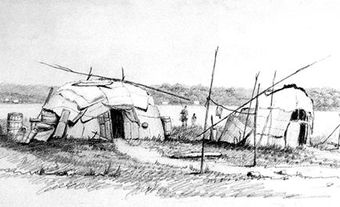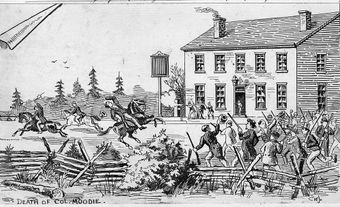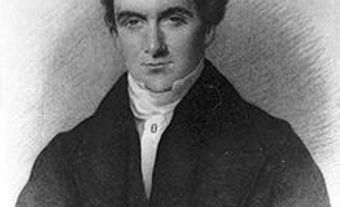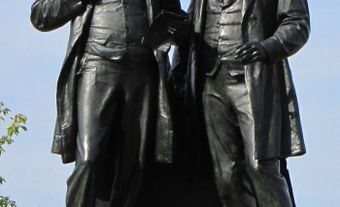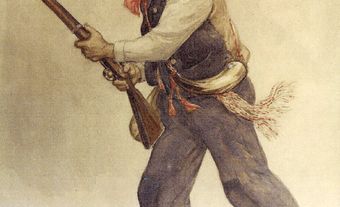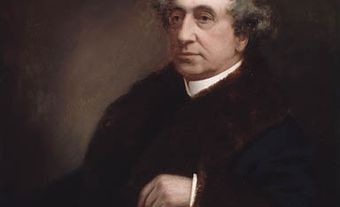Robert Sympson Jameson (born 5 June 1796 in Harbridge, United Kingdom; died 1 August 1854 in Toronto, Ontario), lawyer and politician. Robert Jameson was the last British-appointed attorney general of Upper Canada (1833–37) and the first speaker of the Legislative Council of the Province of Canada (1841–43).

Childhood
Robert Jameson was baptized on 5 June 1796. After the death of his father, Thomas Jameson, he moved to Ambleside in the Lake District with his widowed mother, Mary Sympson, two brothers and sister. There, he grew up among the Romantic poets of early-19th-century England and their families. Robert’s brother Joseph, who supported the family as a clergyman, received a glowing letter of recommendation from the poet William Wordsworth. Robert became a close friend of Hartley Coleridge, son of the poet Samuel Taylor Coleridge.
Early Legal Career
Robert Jameson began his legal studies at Middle Temple, London, in 1818 and was called to the bar in 1823. For six years, he worked as an equity draftsman, co-editing two volumes of bankruptcy reports. In 1829, Jameson was appointed chief justice of Dominica, which he dismissed as a “dismal, vulgar, sensual, utterly unintellectual place.” He declined a subsequent offer of the post of chief justiceship of Trinidad and Tobago and returned to the United Kingdom in 1833.

Marriage and Separation
In 1821, Robert Jameson met Anna Murphy, a governess, artist and writer. According to Anna’s niece and biographer, Geraldine Macpherson, “[Jameson] had come to London to enter seriously upon the business of his profession and was in all the bloom of life and enthusiasm, of agreeable looks, and manners said to have been most fascinating.” Robert and Anna shared literary and artistic interests, but Anna wrote to friends and family during their courtship that their temperaments differed. They were married in 1825.
The Jamesons spent an unhappy winter together in Toronto in 1836–37. Robert and Anna separated amicably in 1837 before her return to the U.K. in 1838. Macpherson later wrote that her aunt “did not see it to be her duty to expatriate herself…in order to share the life of a cold and self-sufficing man.” Biographer Clara Thomas, however, concluded that Jameson’s excessive drinking, which dated from his unhappy months in Dominica, unsociability and diffident personality may have contributed to the breakdown of the marriage. Although Jameson was entitled to his wife’s earnings as an author under the coverture laws in force at the time, he agreed to provide her with an annuity of £300, writing to Anna on 21 September 1837, “My affection you will never cease to retain.” They never saw each other again.
Attorney General and Vice Chancellor
In 1833, Robert Jameson became attorney general of Upper Canada and moved to Toronto, commissioning a large brick house on Wellington Street. He was the last British appointment to that position. His duties included providing legal opinions, commenting on petitions, reviewing applications for licences and patents and addressing legislative, administrative and judicial matters.
In 1837, Jameson was promoted to vice chancellor, the chief legal officer of the Crown in Upper Canada in the newly created Court of Chancery. He remained vice chancellor for a decade after the establishment of the Province of Canada in 1840. Canadian journalist John Charles Dent was critical of Jameson’s performance as vice chancellor, writing, “This gentleman was a fairly efficient jurist, but he had given way to personal infirmities, and had allowed the business of the Court to fall greatly into arrear. Suitors were sometimes unable to obtain decrees after years of delay, and there was an utter want of order and arrangement in the procedure.” Jameson was also treasurer of the Law Society of Upper Canada from 1836 to 1841 and from 1845 to 1846.
Political Career
In 1834, Robert Jameson was invited to run for election to the Upper Canada legislature as the representative for Leeds County, near Brockville, Ontario, by local Irish Orange Order Leader Ogle Robert Gowan. Both Gowan and Jameson ran as independent “constitutional” candidates. Although both Gowan and Jameson were elected by a wide margin, the results were disqualified in February 1835 by a Reformer-dominated legislature because Gowan’s supporters had attacked supporters of Reformer candidates at the public polling place. (The secret ballot would not be introduced in Ontario until 1874.) Gowan and Jameson ran again in 1835. They were once again elected and then unseated because of riots during the election, which included the murder of one of their supporters by a local Reformer tavern keeper — a case that Jameson prosecuted himself.
Following the reforms recommended by Lord Durham in the aftermath of the 1837 rebellion in Upper Canada, the political climate calmed and Jameson once again ran for election in Leeds. He was a member of the Legislative Council of the Province of Canada from 1841 to 1853 and served as the council’s first speaker from 1841 to his resignation in 1843.
Academic, Literary and Cultural Interests
Canadian clergyman Henry Scadding described Jameson as “a man highly educated and possessing great taste, and even skill, in respect of art…His conversation was charged with reminiscences and anecdotes of...the Coleridges, Wordsworths…with all of whom he had been intimate in his youth.” Robert Jameson was part of the first governing council of King’s College, now the University of Toronto, in 1834 and was one of the first councillors of Trinity College in 1851.
Jameson became chief superintendent of education in the Province of Canada in 1841, writing to Baron Sydenham, “We are peculiarly sensible of the necessity for a due provision for the education of the people, the want of which in this province is grievously felt. We feel the establishment of an efficient system, by which the blessings of instruction may be placed within the reach of all, to be a work of difficulty, but that its overwhelming importance demands that it should be undertaken.”
In Toronto, Jameson organized and became president of the Toronto Literary Club in 1836, the St. George’s Society of Toronto in 1839–1841 and 1848 and the Toronto Society of Arts in 1847, creating a lasting cultural legacy for the city. Jameson Avenue in Toronto, where Jameson purchased extensive landholdings in the late 1840s, is named for him.

 Share on Facebook
Share on Facebook Share on X
Share on X Share by Email
Share by Email Share on Google Classroom
Share on Google Classroom
